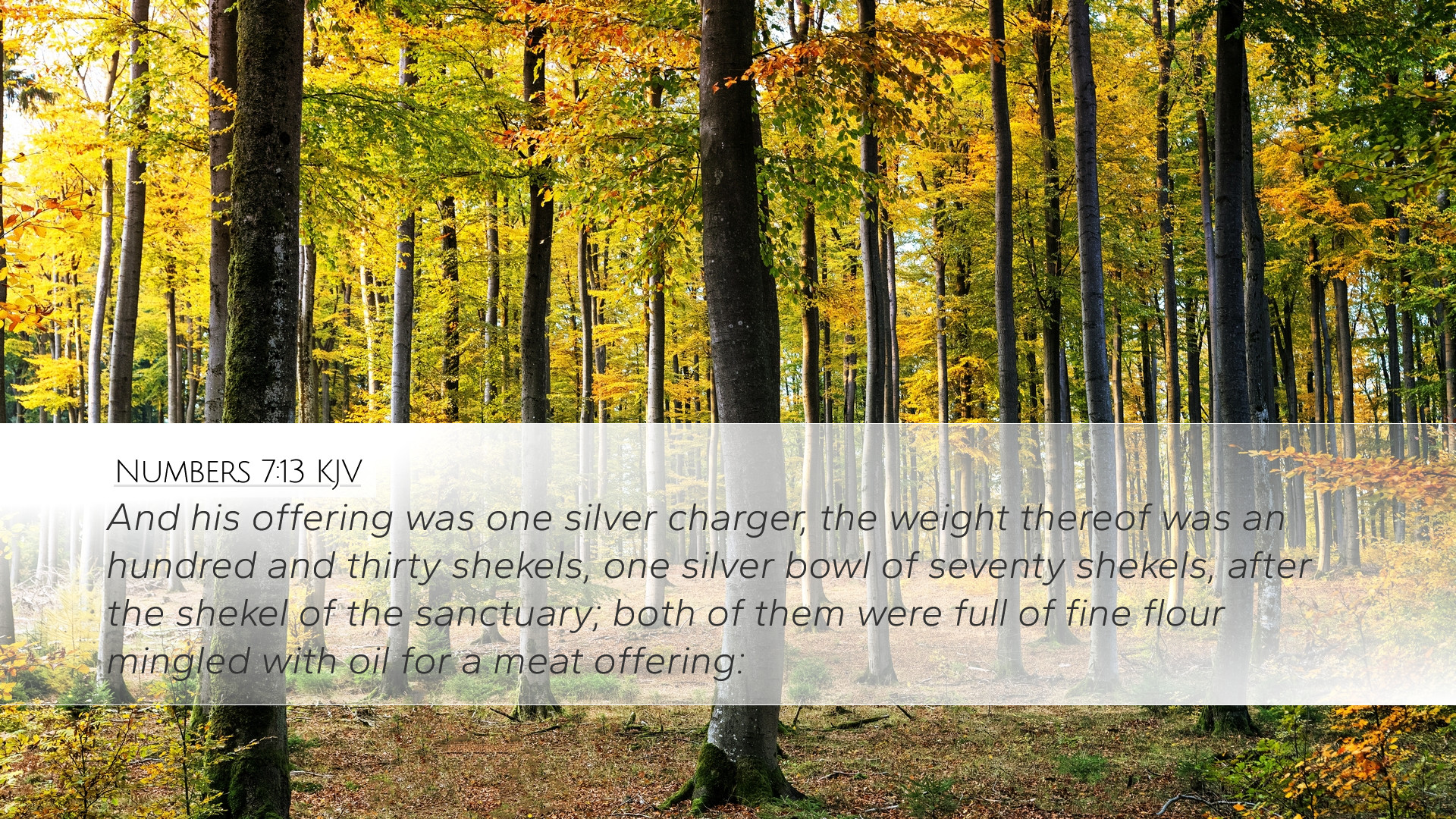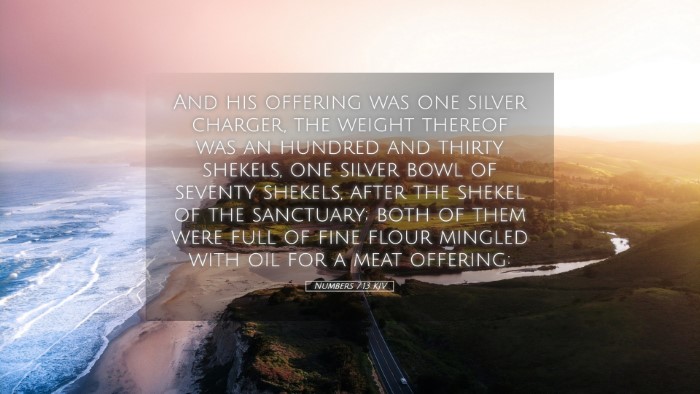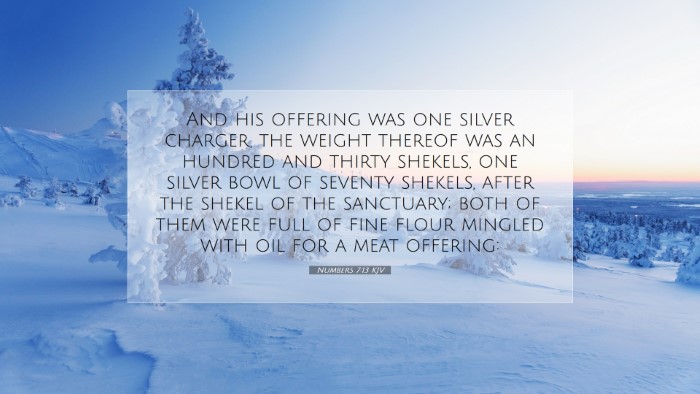Commentary on Numbers 7:13
Verse Context: Numbers 7:13 states, "And his offering was one silver charger, the weight thereof was an hundred and thirty shekels, one silver bowl of seventy shekels, after the shekel of the sanctuary: both of them were full of fine flour mingled with oil, for a meat offering." This passage is part of a larger section in the Book of Numbers where the leaders of Israel bring offerings for the dedication of the altar.
Historical Background
The Book of Numbers chronicles the journey of the Israelites from Sinai to Canaan. It contains various laws, ordinances, and accounts of the Israelites' experiences. The specific verses surrounding Numbers 7 depict the ceremonial offerings brought by each tribe of Israel during the occasion of the altar's anointing. These offerings reflect the leaders' dedication and faithfulness to God.
Commentaries Overview
This commentary synthesizes insights from notable public domain biblical scholars, including Matthew Henry, Albert Barnes, and Adam Clarke. Each contributor provides distinct perspectives that will deepen the understanding of the text.
Matthew Henry's Insight
Matthew Henry emphasizes the significance of the offerings. He notes that the charging of the leaders to provide gifts demonstrates their responsibility and dedication to the community's worship. Henry interprets the silver charger and bowl as symbols of purity and value, reflecting the seriousness with which the leaders approached their duties. He illustrates how each leader's offering is not merely a tradition but an act of devotion towards God.
- Symbolism of Silver: Henry highlights that silver often represents redemption; thus, the offerings speak to the need for atonement and the desire for communal purity as they seek God's favor.
- Fulfillment of Duty: The offerings signify the leaders' roles as stewards of the faith community, showcasing the importance of leadership responsibility in ecclesial contexts.
Albert Barnes' Interpretation
Albert Barnes provides detailed analysis regarding the weights and measures mentioned in the verse. He explains the specifics of the weight of each offering, which reflects the meticulous care of the Israelites in their worship elaboration. The idea of 'shekels of the sanctuary' indicates adherence to divine standards in the construction of worship.
- Details Matter: Barnes stresses that the precise weights are not trivial details; they signify a larger theological point about the importance of ordering worship according to God’s prescribed methods.
- Meaning of Offerings: Each element of the offering was intended to express gratitude and reliance on divine providence. The mingling of fine flour and oil signifies nourishment and communion with God.
Adam Clarke's Thoughts
Adam Clarke elaborates on the context surrounding the offerings. He points out that this moment was critical in establishing the ritual framework for Israel as they prepared to settle in the Promised Land. Clarke draws parallels between these ancient practices and contemporary worship principles.
- Framework of Worship: Clarke notes that the offerings serve as a foundational component in the establishment of Israel’s corporate worship, pointing towards a structured approach to honoring God.
- Relevance for Today: He encourages modern readers to reflect on how offerings in church today can be seen as acts of worship, commitment, and service both to God and the community.
Theological Reflections
The significance of Numbers 7:13 offers rich theological implications for both pastoral practice and personal faith. The combination of silver, flour, and oil in offerings highlights several key theological themes:
- Holiness of Worship: The meticulous detail in worship highlights God's holiness and the seriousness with which His people must approach Him.
- Corporate Responsibility: The leaders' collective action reflects the idea of corporate faithfulness, suggesting that worship is both an individual and communal expression.
- Symbolism of Offerings: Each element of the offering can be seen as a representation of the believer's life — offerings should be whole, pure, and aimed at glorifying God.
Application for Modern Believers
As we study Numbers 7:13, several applications become clear for modern believers, including:
- Cultivating a Heart of Worship: Believers should recognize the worthiness of God and come before Him with offerings that reflect their devotion and gratitude.
- Attention to Detail in Worship: Just as the Israelites were called to be precise in their offerings, so too should contemporary worship be intentional and reflective of God’s nature.
- Community and Leadership: Leaders within churches today must understand their role in fostering a community that worships God collectively and consciously honors Him in all aspects of church life.
Conclusion
Numbers 7:13, though a seemingly straightforward description of an offering, opens a window into the seriousness of worship, the responsibility of leadership, and the nature of communal faith in the life of ancient Israel. The insights of Matthew Henry, Albert Barnes, and Adam Clarke provide a multifaceted understanding of this text, which remains relevant for the Church today. As pastors, students, theologians, and scholars reflect on this verse, they are encouraged to consider not just the historical implications but also the personal and communal applications of worship in their own lives.


